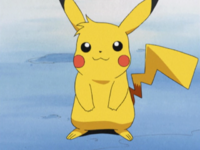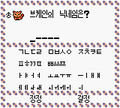Nickname: Difference between revisions
Michylawhty (talk | contribs) |
|||
| Line 7: | Line 7: | ||
===Limits on nicknames=== | ===Limits on nicknames=== | ||
[[File:Gen III nickname limit.png|frame | [[File:Gen III nickname limit.png|frame|Comparison of the same English Mewtwo in Japanese and English Generation III games]] | ||
Nicknames have a maximum length of ten characters, five in Japanese games. These characters are in turn limited by the character palette in the games. The characters available have expanded over the generations: in Generation I it was impossible to use numbers in nicknames, while later generations allowed both numbers and non-alpha-numeric symbols. In Generation I, it was possible to input a Pokémon's nickname as ten spaces, so when mentioned, no letters would appear. In subsequent generations, this would revert to the species name, even if the nickname is confirmed. Generation VI increased the character limit on nicknames, increasing it to twelve | Nicknames have a maximum length of ten characters, five in Japanese games. These characters are in turn limited by the character palette in the games. The characters available have expanded over the generations: in Generation I it was impossible to use numbers in nicknames, while later generations allowed both numbers and non-alpha-numeric symbols. In Generation I, it was possible to input a Pokémon's nickname as ten spaces, so when mentioned, no letters would appear. In subsequent generations, this would revert to the species name, even if the nickname is confirmed. Generation VI increased the character limit on nicknames, increasing it to twelve characters (six for Japanese games). | ||
Traded Pokémon cannot be renamed unless they are returned to their original game; if it is impossible for the traded Pokémon to be returned, it cannot be renamed at all. If taken to a Name Rater, he will say the name is "perfect" and refuse to change it. This is to maintain the unique character given to the Pokémon by its [[Original Trainer]]. The game recognizes the trade when the OT number assigned to the Pokémon does not match the number on the save file. Very rarely will two players' numbers coincide; this is the only time when traded Pokémon may be renamed. | Traded Pokémon cannot be renamed unless they are returned to their original game; if it is impossible for the traded Pokémon to be returned, it cannot be renamed at all. If taken to a Name Rater, he will say the name is "perfect" and refuse to change it. This is to maintain the unique character given to the Pokémon by its [[Original Trainer]]. The game recognizes the trade when the OT number assigned to the Pokémon does not match the number on the save file. Very rarely will two players' numbers coincide; this is the only time when traded Pokémon may be renamed. | ||
Revision as of 14:39, 17 November 2013

A nickname is a name given to a Pokémon by its Original Trainer. Every time a player catches, hatches, or is given a new Pokémon in a main series game, he or she is able to nickname the Pokémon to a maximum of ten characters. In addition to the games, nicknamed Pokémon have also been shown in the Pokémon anime and several manga series. Nicknames serve as a means of personalizing one's Pokémon, and distinguishing them from other individuals of the same species.
In the games
Players are given the option to nickname their Pokémon immediately after receiving them in any manner, such as receiving it from an NPC, hatching from an Egg, or capturing in a Poké Ball. The only way to change the nickname is by taking the Pokémon to a Name Rater.
Limits on nicknames
Nicknames have a maximum length of ten characters, five in Japanese games. These characters are in turn limited by the character palette in the games. The characters available have expanded over the generations: in Generation I it was impossible to use numbers in nicknames, while later generations allowed both numbers and non-alpha-numeric symbols. In Generation I, it was possible to input a Pokémon's nickname as ten spaces, so when mentioned, no letters would appear. In subsequent generations, this would revert to the species name, even if the nickname is confirmed. Generation VI increased the character limit on nicknames, increasing it to twelve characters (six for Japanese games).
Traded Pokémon cannot be renamed unless they are returned to their original game; if it is impossible for the traded Pokémon to be returned, it cannot be renamed at all. If taken to a Name Rater, he will say the name is "perfect" and refuse to change it. This is to maintain the unique character given to the Pokémon by its Original Trainer. The game recognizes the trade when the OT number assigned to the Pokémon does not match the number on the save file. Very rarely will two players' numbers coincide; this is the only time when traded Pokémon may be renamed.
Pokémon traded from an English or international Generation III game to a Japanese one will have all letters of their nickname after the fifth hidden by the game, so that a Houndour named "Remilia" in the English game would display its name as "Remil" in the Japanese game. Likewise, non-nicknamed Pokémon are affected, with a Pikachu traded to a Japanese game having its name displayed as PIKAC. When traded back to a non-Japanese game, the shortened nickname will return to normal. This name-shortening issue was fixed for the Generation IV games, where a Pokémon will display its full name regardless. Likewise, a Pokémon traded from games of different languages in Generation III, whether or not the same Pokémon has a different name, the foreigner name will be treated as a nickname and will be retained upon evolution. For example, if a German Rettan is traded to an English copy of Pokémon FireRed and is then evolved, the Arbok will be named RETTAN even if it was not originally nicknamed, and the player of the English game will not be able to change the nickname, unless it's traded back to its original game. This was fixed in Generation IV, as not-nicknamed, foreigner Pokémon will have their names changed to the corresponding species and language upon evolution.
If a Pokémon is created or modified through the Pokésav program and its name is set to something else, it will show that the Pokémon can have up to 11 characters in its name; this is not true if the user was to set the 11th character and load the save file the name will be invisible to the game, possibly because the game doesn't know how to deal with a non-null character in the 11th spot which is usually null. This has been proven in Pokémon Platinum, but it is probably the same with any Generation IV game. In Generation V, it just causes random symbols to be placed after the name.
In Pokémon Colosseum and Pokémon XD, a Shadow Pokémon cannot be nicknamed if it has not been purified. Immediately after this happens, the option will be given. Wild Pokémon caught from a Poké Spot in XD can be nicknamed as they are normally in the main series.
In the Japanese and English versions of Pokémon Black and White, the game will recognize when a nickname is profanity, and will not allow the player to use this as a nickname. However, the Poké Transfer does not prevent Pokémon with vulgar nicknames from being transferred forward.
Outcomes of nicknaming
Nicknaming Pokémon rarely has any effect on game-play, and is simply an element of customization that players are free to use or ignore. The only games in which nicknamed Pokémon are treated differently are Pokémon Stadium and Pokémon Stadium 2. In these games, when nicknamed Pokémon transferred from a main series game they have a chance of being alternately colored. This coloration is not the same as being a Shiny Pokémon. This feature has not been included in any later games.
Sometimes, in Pokémon Ruby, Sapphire, and Emerald, when the player gives a previously caught Pokémon a nickname at the Name Rater's house, the Hoenn TV network will report the nickname chosen. The host will always commend the player on his or her choice of name, even if the player decides to leave the Pokémon's name as it was. When records have been mixed with another save file, the television network may report on the other Trainer's choice of nicknames.
With Generation IV's Global Trade Station, some unfortunate naming issues may arise. The main issues are receiving Pokémon with nicknames in a foreign language and receiving Pokémon whose nicknames are threatening, inappropriate, racist, vulgar or pointless (for example, a name consisting of random characters). As the chances of matching both the Trainer ID and Secret ID are near impossible, these nicknames cannot be changed.
In Pokémon Black 2 and White 2 there is a Medal awarded for having nicknamed Pokémon 10 times.
Pokémon with nicknames deemed "inappropriate" may show up in Battle Videos as Pokémon without a nickname: a Staraptor named inappropriately would have its nickname reverted to "STARAPTOR". It is unknown if this censoring is automatic or done on a case-by-case basis by Nintendo employees.
Non-player characters and nicknames
NPC-nicknamed Pokémon are somewhat rare, and almost never encountered in battles. However, all Pokémon acquired from in-game trades have nicknames, as well as all Pokémon used by NPC Coordinators. Likely to emphasize the color change effect, most of the Pokémon encountered in Pokémon Stadium also have nicknames. Team Rocket's nicknamed Pokémon have numbers in their nicknames (which was impossible on hand-held games at the time).
In Black 2 and White 2, due to NPC and player switching one of their Pokémon in PWT's Mix Tournament, it is possible to fight a nicknamed Pokémon if the Pokémon chosen by opponent had a nickname.
List of characters
Generation I
Generation II
Generation III
Generation IV
In side games
Pokémon Channel
In Pokémon Channel, the player has the option to nickname his or her companion, Pikachu, once they become familiar enough with each other.
Pokémon Mystery Dungeon
In the Pokémon Mystery Dungeon series, the player has the option to name their player, which is defaulted to the Pokémon they transformed into. They also have the option of nicknaming any Pokémon that joins their team. Unlike in the main games, however, nicknames cannot be changed, as there is no service akin to the Name Rater in the series.
In the anime

As in the games, nicknaming Pokémon is optional. It is very seldom that main characters have nicknamed their Pokémon, leaving nicknaming largely unique to one-time characters. Often, these characters possess more than one of a species of Pokémon, and nicknaming is to provide distinction, such as in Get Along, Little Pokémon. At other times, the nicknames help to drive the plot, as in Wherefore Art Thou, Pokémon.
The only main characters to possess a nicknamed Pokémon are Misty, who has a Luvdisc known as Caserin, and James, who has a Growlithe called Growlie. Ritchie, a recurring character, also uses nicknames.
In the manga
In the Pokémon Adventures manga
Some Pokémon manga series use nicknames as a way to differentiate and individualize Pokémon characters. Almost every Pokémon owned by a main character in the Pokémon Adventures series is nicknamed. Quite often, the Trainer will nickname his or her Pokémon with a particular pattern, such as how Crys ends most of her Pokémon's nicknames with the "e" sound, and Gold ends most of his Pokémon's names with "bo". Brock's six Geodude are each named after a number, from "Geoone" to "Geosix".
| Pokémon training | |
|---|---|
| Catching • Nicknaming • Battling • Evolving • Trading • Breeding • Releasing | |














